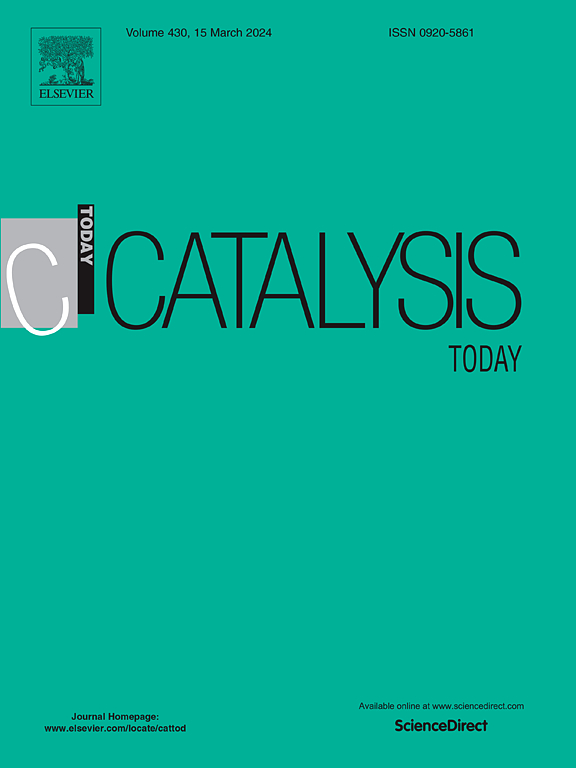Glycolysis of poly (ethylene terephthalate) using DBU-based ionic liquid catalysts
IF 5.2
2区 化学
Q1 CHEMISTRY, APPLIED
引用次数: 0
Abstract
This research investigated depolymerization of poly (ethylene terephthalate) (PET) via glycolysis using a series of ionic liquid (IL) catalysts. Organic acids were paired with 1,8-Diazabicyclo [5.4.0] undec-7-ene (DBU) to produce ionic liquids (DBU-ILs). The study explored the effect of structural variations in the organic acids on PET conversion and bis (2-hydroxyethyl) terephthalate (BHET) yield under optimized reaction conditions (specifically, EG:PET ratio of 5:1, temperature of 190 °C, reaction time of 120 min, and 5 mol% DBU in the catalyst relative to PET). The organic acids were selected to include variation in the (i) number of carboxylic acids available to complex with DBU and (ii) structure of the linker and pendant groups to adjust the lipophilicity of the catalyst. The catalytic activity of the DBU-IL increased with increasing lipophilicity of organic acid. Catalysts with organic acids with aromatic linkers (i.e. terephthalic acid) exhibited lower activities than aliphatic linkers at similar lipophilicity. Notably, a linear relationship was observed between the catalytic activity and lipophilicity for diacids with aliphatic linker of increasing chain length. The apparent rate constant for the DBU-azelaic acid was 32 % greater than for DBU-oxalic acid. Reusability studies showed that there was minimal degradation of the catalytic activity of the DBU-ILs over five reaction cycles.
用dbu基离子液体催化剂进行聚对苯二甲酸乙酯的糖酵解
本研究采用一系列离子液体(IL)催化剂对聚对苯二甲酸乙酯(PET)进行糖酵解聚。有机酸与1,8-二氮杂环[5.4.0]十一-7-烯(DBU)配对生成离子液体(DBU- ils)。在优化的反应条件下(如:PET比为5:1,反应温度为190℃,反应时间为120 min,催化剂中DBU相对于PET为5 mol%),研究了有机酸结构变化对PET转化率和对苯二甲酸乙酯(BHET)产率的影响。有机酸的选择包括改变(i)与DBU配合的羧酸数量和(ii)连接剂和悬垂基团的结构,以调节催化剂的亲脂性。DBU-IL的催化活性随着有机酸亲脂性的增加而增加。在亲脂性相似的情况下,含芳香连接剂(即对苯二甲酸)的有机酸催化剂表现出比脂肪连接剂更低的活性。值得注意的是,对于链长增加的脂肪连接体的二酸,其催化活性与亲脂性呈线性关系。dbu -壬二酸的表观速率常数比dbu -草酸高32 %。可重用性研究表明,在5个反应循环中,dbu - il的催化活性降解最小。
本文章由计算机程序翻译,如有差异,请以英文原文为准。
求助全文
约1分钟内获得全文
求助全文
来源期刊

Catalysis Today
化学-工程:化工
CiteScore
11.50
自引率
3.80%
发文量
573
审稿时长
2.9 months
期刊介绍:
Catalysis Today focuses on the rapid publication of original invited papers devoted to currently important topics in catalysis and related subjects. The journal only publishes special issues (Proposing a Catalysis Today Special Issue), each of which is supervised by Guest Editors who recruit individual papers and oversee the peer review process. Catalysis Today offers researchers in the field of catalysis in-depth overviews of topical issues.
Both fundamental and applied aspects of catalysis are covered. Subjects such as catalysis of immobilized organometallic and biocatalytic systems are welcome. Subjects related to catalysis such as experimental techniques, adsorption, process technology, synthesis, in situ characterization, computational, theoretical modeling, imaging and others are included if there is a clear relationship to catalysis.
 求助内容:
求助内容: 应助结果提醒方式:
应助结果提醒方式:


